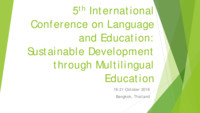Language and the Sustainable Development Goals - UN Symposium
Symposium: Language and language differences tend to get taken for granted by planners The Study Group on Language and the United Nations, an independent group of scholars and practitioners on matters related to language, convened a symposium on Language and the Sustainable Development Goals in New York, on 21 and 22 April 2016. Its goal was to examine the importance of issues of language in the formulation, implementation, and successful completion of the Sustainable Development Goals (SDGs).


